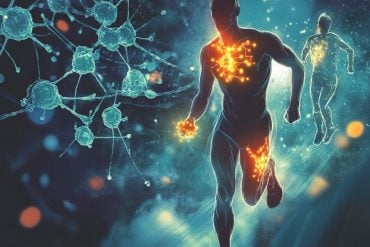Summary: A new study reports long-term cognitive problems that occur following COVID-19 infection may be a result of fatigue rather than pathological alterations in the brain.
Source: SNMMI
Long-term cognitive problems after a COVID-19 diagnosis may be a result of fatigue rather than pathological changes in the brain, according to a study published ahead-of-print in The Journal of Nuclear Medicine.
An analysis of neuropsychological testing and 18F-FDG PET imaging showed that few or no objective impairments were observed in the cognition and brain pathology of long-COVID patients; however, many of the group suffered from subjective complaints such as severe fatigue.
The term “long-COVID syndrome” is used to describe symptoms that arise in the aftermath of a COVID-19 infection (usually defined as being present later than 12 weeks after the infection), including cognitive deficits—such as brain fog, memory loss and attention problems—as well as fatigue and exhaustion. The underlying cause of these symptoms is unknown.
Previously published studies showed that patients needing inpatient treatment because of newly diagnosed COVID-19 have reduced glucose metabolism in the brain, which is associated with impaired cognitive function. To assess whether patients suffering from long COVID experience similar deficits, researchers conducted neuropsychological testing and cerebral 18F-FDG PET imaging.
Thirty-one patients who sought counseling for persistent neurocognitive symptoms were included in the present study. Patients participated in a battery of neuropsychological tests, and the results were analyzed to determine cognitive impairment levels. Average group results of the testing showed no impairment. Mild deficits were observed in some patients on the single-subject level, however, mainly in regard to visual memory.

18F-FDG PET imaging was recommended to all patients who received counseling, and 14 of the 31 patients proceeded. Clinical assessment of each patient’s scan revealed no distinct pathological findings or alternative diagnoses. When the scans were compared to those of a control group, no significant differences were noted.
The lack of significant findings on 18F-FDG PET scans and only mild impairments on neuropsychological testing is in contrast to the severe and lasting disability self-reported by the patients. Fatigue, however, was particularly prevalent in the group, reported by 61 percent of study participants. Fatigue often follows viral infections and inflammation and has been related to immune processes and chronic fatigue syndrome in long COVID.
“This suggests that the fatigue, not brain regional dysfunction, may be responsible for many long-COVID symptoms,” the researchers concluded.
About this neurology and COVID-19 research news
Author: Rebecca Maxey
Source: SNMMI
Contact: Rebecca Maxey – SNMMI
Image: The image is credited to Dressing et al., Medical Center – University of Freiburg, Faculty of Medicine, University of Freiburg, Freiburg, Germany.
Original Research: Open access.
“Neuropsychological profiles and cerebral glucose metabolism in neurocognitive Long COVID-syndrome” by Andrea Dressing, Tobias Bormann, Ganna Blazhenets, Nils Schroeter, Lea I Walter, Johannes Thurow, Dietrich August, Hanna Hilger, Katarina Stete, Kathrin Gerstacker, Susan Arndt, Alexander Rau, Horst Urbach, Siegbert Rieg, Dirk Wagner, Cornelius Weiller, Philipp T Meyer and Jonas A Hosp. Journal of Nuclear Medicine
Abstract
Neuropsychological profiles and cerebral glucose metabolism in neurocognitive Long COVID-syndrome
During the Corona Virus Disease 2019 (COVID-19) pandemic, Long COVID-syndrome, which impairs patients through cognitive deficits, fatigue, and exhaustion, has become increasingly relevant. Its underlying pathophysiology, however, is unknown. In this study, we assessed cognitive profiles and regional cerebral glucose metabolism as a biomarker of neuronal function in outpatients suffering from long-term neurocognitive symptoms after COVID-19.
Methods: Outpatients seeking neurological counseling with neurocognitive symptoms persisting for more than three months after polymerase chain reaction (PCR)-confirmed COVID-19 were included prospectively between June 16, 2020, and January 29, 2021. Patients (n = 31, 54±2.0 years) in the long-term phase after COVID-19 (202±58 days after positive PCR) were assessed with a neuropsychological test battery. Cerebral 18F-FDG PET imaging was performed in 14/31 patients.
Results: Patients self-reported impaired attention, memory, and multitasking abilities (31/31), word-finding difficulties (27/31), and fatigue (24/31). Twelve of 31 patients could not return to the previous level of independence/employment. For all cognitive domains, average group results of the neuropsychological test-battery showed no impairment, but deficits (z-score<-1.5) were present on single-patient level mainly in the domain of visual memory (in 7/31; other domains ≤2/31). Mean MoCA performance (27/30 points) was above the cutoff-value for detection of cognitive impairment (< 26 points), although 9/31 patients performed slightly below this level (23-25 points). In the subgroup of patients who underwent 18F-FDG PET, we found no significant changes of regional cerebral glucose metabolism.
Conclusion: Long COVID patients self-report uniform symptoms hampering their ability to work in a relevant fraction. However, cognitive testing showed minor impairments only on single-patient level approximately six months after the infection, whereas functional imaging revealed no distinct pathological changes. This clearly deviates from previous findings in subacute COVID-19 patients, suggesting that underlying neuronal causes are different and possibly related to the high prevalence of fatigue.







